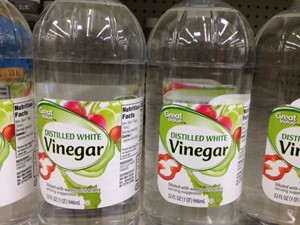A Cleaner World Blog
The Scoop on Fabric Softener and Dryer Sheets
There was a stark difference in bath towels between my grandparent’s house and my parent’s house. When I was growing up, I hated bathing at my grandparent’s house because their towels were stiff as a board. My grandmother washed her towels in a wringer washer, using homemade lye soap and no fabric softener, and hung them to dry; the difference in hardness depended on the season. Spring, summer, and fall, they were hung outside and that meant medium stiffness. In the winter, they were hung in the basement to dry. Years ago, I shared with you how the towels at my parent’s house always felt slimy. The reason? Too much fabric softener. Talk about from one extreme to another.
So, what are fabric softener and dryer sheets and is there a difference?
Fabric Softener is a liquid that is added during the rinse cycle and is designed to soften fibers, reduce wrinkles, add fragrance, and reduce static cling. Dryer sheets are, well, little sheets that are added to the dryer when you put in your wet clothes and basically do the same thing that liquid fabric softener does. The big difference is that fabric softener penetrates the fibers of garments and towels where dryer sheets just coat the surface of the fibers.
What are the pros and cons of using these items?
Pros – Lots of detergent makers tout benefits like fresh smell, soft fibers, preserving clothes, protect sensitive skin, and so on.
Cons – Whether you use the liquid form or dryer sheets, both go onto clean clothes where they either penetrate or coat fibers. Over time, it builds up and leaves the fibers of your things impermeable to water and detergent. Plus, I know folks that are sensitive to the artificial fragrances in fabric softeners, and many times, they can cause skin irritations and respiratory distress.
Are there items you should never use either product on?
Yes! Avoid using these products on towels (because they reduce absorbency), sportwear (they interfere with the garment’s wicking ability), microfiber (they can destroy the fiber’s absorbency factor), and flame-resistant clothes (they interfere with the flame-resistant properties).
What are some of the alternatives?
- Vinegar – Sometimes, when I feel like my towels aren’t soft enough, I’ll add a ¼ - ½ cup of white vinegar during the rinse cycle; however, it doesn’t help with static. Another benefit of vinegar is that it can cut through too much laundry detergent, plus it doesn’t leave any funny odor behind.
- Aluminum foil – No kidding. You can wad up foil into 3” balls and place 2-3 into the dryer to help with static, but unfortunately, they don’t help with softness.
How do I make my clothes smell good without using these products?
- Vinegar – as mentioned above, adding during the rinse cycle, can cut through damp, musty smells.
- Baking Soda - Add roughly ½ cup of baking soda to your washer while it’s filling with water, and let it dissolve before adding your clothes. It will regulate the pH level of the water, which will reduce odors.
- Homemade dryer sheets – Add a couple drips of your favorite essential oil to a damp cloth and add it to your dryer during the last 10 minutes of the drying cycle. My go-to is always vinegar, but I am anxious to try this one!
If you are having issues with clothing static, odor, or softness, contact us or stop by one of our locations. As always, we are here to help.



